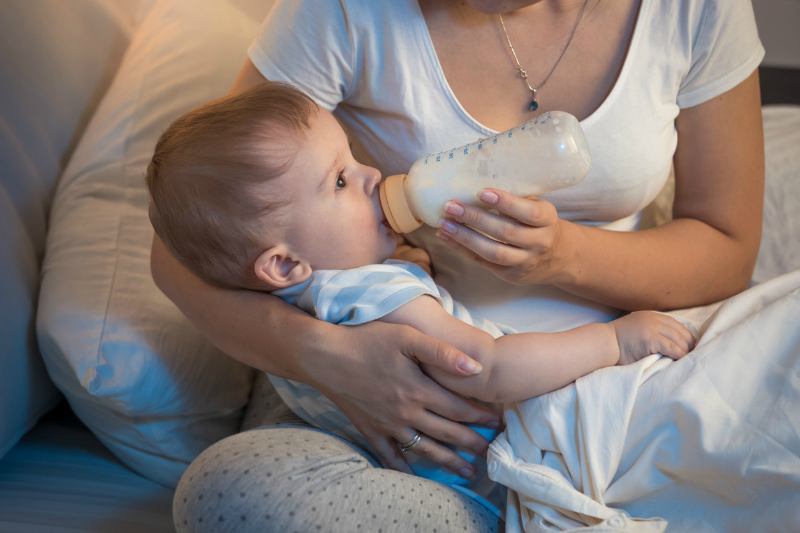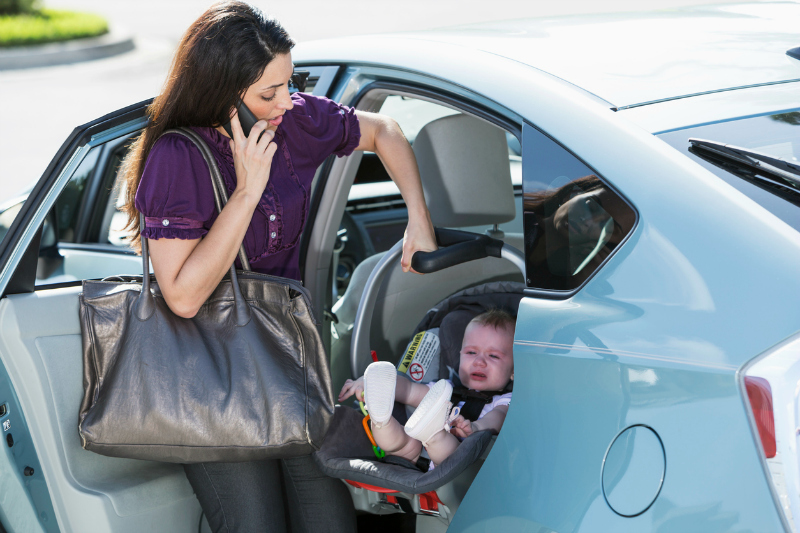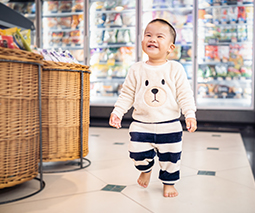7 things NOT to stress about when feeding your baby

When did things get so complicated when it comes to feeding our babies? Once upon a time having a baby and raising a child were just things people did, as ordinary and unremarkable as chopping onions for dinner or darning socks by the fire! So instead of worry, discussion and dissension, let’s just stop. And breathe.
These days, sharing about your baby on social media, is like running the gauntlet of everybody’s opinion. We all feel judged. We think if one mother is ‘right’, that makes the rest of us ‘wrong’. We forget that there is no one ‘right’ way when it comes to parenthood.
And no topic is more contentious for mums than feeding (with baby’s sleep a close second). Some of us breastfeed our babies. Some of us bottle feed. Some of us breastfeed, then bottle feed expressed milk or formula. All of us are mothers just trying to do our best.
Here are seven things you really don’t need to stress about when it comes to feeding your baby, however you choose to do it!
1. Opinions of strangers, friends and family
When you have a baby, suddenly everyone feels entitled to have a vocal opinion: the waitress, the rude stranger on the bus, or the grumpy old man in the park. And yes, more often than not, your friends and family.
Our advice: Ignore strangers, listen politely to friends and well-meaning family, and then only take the advice you think is helpful for your baby. YOUR baby.
2. You are feeding your baby too much
It’s a bit easier to work this one out if you bottle feed your baby – just follow the instructions on the formula tin according to their age. You’ll be able to tell whether they’re drinking it all or not! Breastfed babies vary in the number of feeds they need in a 24-hour period, and it can change depending on their mood, growth spurts, how hot it is, illness and any other number of factors. Between eight to 12 times is the norm for newborn babies, but it’s easier not to count at all and to just offer the breast periodically throughout the day. Don’t worry about overfeeding a breastfed baby – your baby (and your breasts) will accommodate the changes.
And of course, if you have any serious concerns you can talk to your doctor or a lactation consultant.
3. Your baby is gaining too much weight
Sometimes, the smallest comment from a stranger – “ooooh, he’s a big boy, look at those rolls” – can be interpreted the wrong way, and drive mothers to worry that their baby is ‘too fat’. In most cases, weight gain is perfectly normal, even if the baby is in the 100th percentile for weight (bigger than 100 per cent of babies the same age). Doctors don’t tend to worry too much about which percentile the baby is in. They are much more concerned about the consistency of their rate of growth.
If you’re worried about your baby’s weight, your baby health nurse or paediatrician is the best person to see to set your mind at ease.

4. Your baby isn’t keeping up with other babies
Once you hear that seven-week-old Ava is breastfeeding every four hours and Hendrix has dropped his midday bottle, it can be easy to feel that your little one has to keep up. Babies hit milestones (if you can call dropping a feed a milestone) in their own time. If you’re worried, ask your baby if she’s thinking about dropping a feed just because Hendrix did.
Chances are, she’ll reply with a toothy smile and a head wiggle (roughly translated as: “Why are you so worried, Mum? I’m fine!”)! And if your baby doesn’t care in the slightest, why should you?
5. Your baby will ‘fail to thrive’ when you return to work
We all know that a loving, present parent is one of the best gifts a child can have. I don’t want to underplay the importance of a mother in a child’s life, but in order to thrive, children simply need a caring, engaged adult (whether their grandparent, father or a responsible carer). If that happens to be you for the first hour of the day, then a daycare staffer, then their father after work, and then you to bath and get them ready for bed, then that is wonderful!
It’s healthy for kids to have relationships with lots of caring adults. I don’t say this to make you feel that anyone could be your child’s mother – no one can replace a mother’s hug – but so that you return to work (if that’s your choice) safe in the knowledge that by doing so, your baby won’t be deprived or disadvantaged in any way.

6. Your baby isn’t getting enough milk
While there are new technologies that track exactly how much milk a breastfed baby is drinking, these gadgets don’t tend to be recommended by doctors. Measuring milk intake can become an obsession and mothers can rely too much on data-tracking, and less on watching for the clearer signs that their baby is flourishing. Obviously, you don’t need a fancy gadget to see how much bottle-fed babies are drinking, but keep in mind that every baby will have a different appetite.
There are some simple signs of a well-fed baby to look out for so that you’re not worrying unnecessarily:
- 5-8 wet nappies in a 24 hour period
- 1-3 regular bowel movements (sometimes more for younger babies) in a day (although breastfed babies may go days without a bowel movement and this is fine too)
- general weight gain and height/head circumference growth
- good skin colour and muscle tone
- general contentedness
7. Your baby should have weaned by now
Some mums choose to wean their baby because of a return to work, the imminent arrival of a baby sibling, or a host of other personal reasons. When we hear a friend talk about how she gradually dropped Charlie’s breastfeeds (or replaced them with the bottle), it can be easy to feel that we should wean our little one too.
But when babies are given the chance to self-wean it becomes evident how different each baby is. Some will self-wean at 11 months, others at three and a half years. A lot of it comes down to individual temperament – because breastfeeding isn’t just about nutrition: it’s also about comfort, connection and prevention of illness.
Relax, and trust that you are on your own journey with your baby. And more likely than not, one day you’ll look back and wonder why anyone else’s opinion or choices ever really mattered at all!









